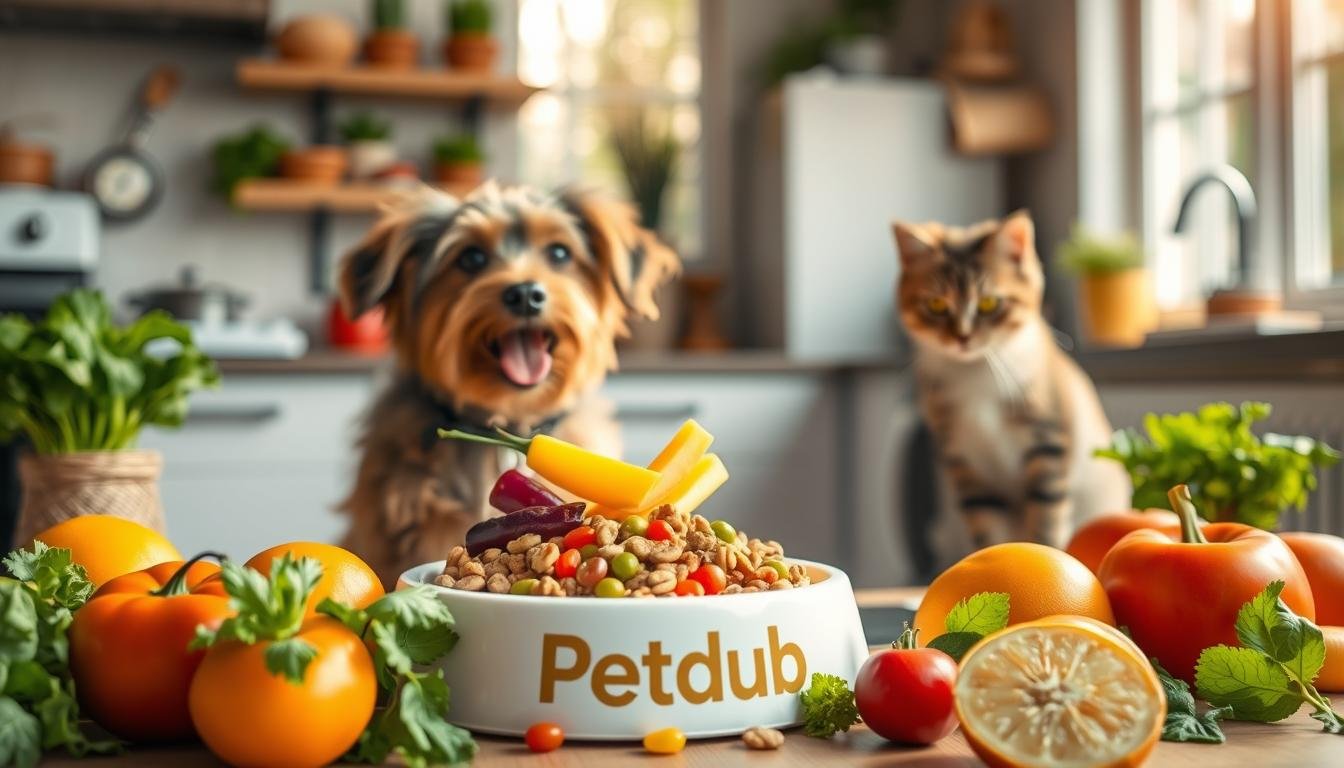We all want our pets to be happy and healthy, and the right food is key to their well-being. Healthy pet diets are the foundation for a long, active life. I learned this from my golden retriever, Buddy. He used to be full of energy but started to slow down. His coat lost its shine, and he was tired during walks. The vet said it was time to look at his diet.
After a few changes, Buddy was back to his old self. This taught me the importance of balanced nutrition. In this guide, we’ll share tips to keep your pet happy and healthy. We’ll cover everything from understanding their needs to choosing the right food and supplements.
Key Takeaways
- Proper pet nutrition is essential for overall health and well-being
- Understanding your pet’s life stage, activity levels, and breed considerations is key to choosing the right diet
- Evaluating pet food labels and ingredients can help you make informed decisions about balanced, high-quality meals
- Incorporating fresh foods, supplements, and a raw diet can provide additional nutritional benefits
- Strategies for pet weight management and addressing dietary allergies or sensitivities are crucial for your pet’s well-being
Why Proper Pet Nutrition Matters
Keeping your pet’s diet balanced is key to their health and happiness. It helps them grow strong and prevents serious health issues. A good diet ensures your pet lives a long, happy life.
Impact on Overall Health and Wellbeing
A healthy diet gives your pet the vitamins and nutrients they need. It boosts their immune system and keeps their skin, coat, and bones strong. With the right pet nutrition importance, they can fight off diseases and heal faster.
Preventing Obesity and Related Issues
A well-planned diet helps keep your pet at a healthy weight. Obesity can lead to serious problems like pet obesity prevention, joint pain, and diabetes. By choosing the right pet health and wellness foods, you can prevent these issues and keep your pet active.
Proper pet nutrition is essential for their health and happiness. By understanding their dietary needs and feeding them well, you ensure they live their best life.
“A healthy diet is the bedrock of a healthy pet. It’s the single most important thing you can do to support your pet’s long-term pet health and wellness.” – Dr. Jane Doe, Veterinary Nutritionist
Understanding Pet Nutritional Needs
Feeding our pets is not a one-size-fits-all job. Each pet has its own pet nutritional needs based on their life stage, activity level, and breed. Knowing these needs is crucial for a balanced diet that keeps them healthy and happy.
Life Stage Requirements
Pets need different foods as they grow. Puppies and kittens need lots of protein, fat, and nutrients for their fast growth. Adult pets need a balanced diet to stay in shape. Senior pets often need less food and more fiber to help with their slower metabolism.
Activity Levels and Breed Considerations
A pet’s activity and breed greatly affect their nutritional needs. High-energy breeds like Labradors need more calories and protein. Less active pets like Pugs might need less food. Tailoring their diet to their lifestyle helps keep them healthy and active.
| Life Stage | Nutritional Requirements |
|---|---|
| Puppy/Kitten | Higher protein, fat, and essential nutrients |
| Adult | Balanced diet to maintain physique |
| Senior | Reduced calorie intake, increased fiber |
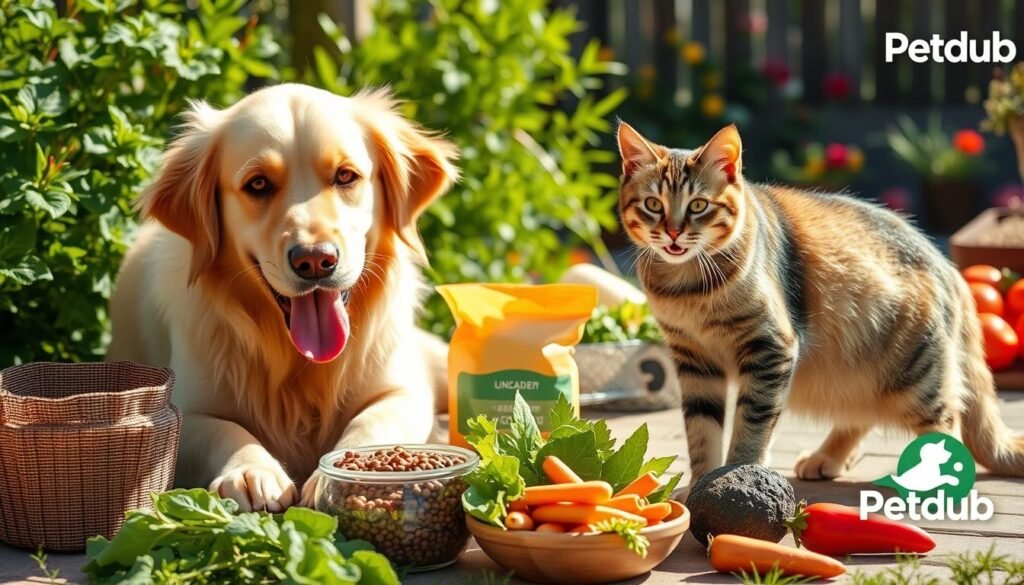
Understanding pet life stage requirements and activity and breed considerations helps us create a diet plan. This plan supports our pets’ health and wellbeing at every stage of their lives.
Healthy pet diets: Choosing the Right Food
Walking down the pet food aisle can feel overwhelming. There are so many choices. But, by knowing what to look for, we can pick the best food for our pets. Let’s look at the important things to consider when choosing food for your pet.
Understand Your Pet’s Nutritional Needs
Every pet is different. Their needs change based on age, how active they are, and their breed. Before picking a food, talk to your vet. They can tell you what your pet really needs. This way, you can find the best healthy pet food choices for them.
Prioritize Quality Ingredients
Choosing the right food means looking at the ingredients. High-quality, whole-food proteins should be the main part of the food. Stay away from fillers, by-products, and artificial stuff that can harm your pet.
| High-Quality Protein Sources | Ingredients to Avoid |
|---|---|
| Chicken, turkey, fish, lamb, beef | Corn, wheat, soy, artificial preservatives, colors, and flavors |
Make sure the food also has the right vitamins, minerals, and nutrients. These are important for your pet’s health.
“The key to a healthy pet diet is finding a food that meets your pet’s unique nutritional needs while prioritizing quality ingredients.”
By focusing on your pet’s needs and choosing a high-quality, balanced pet food, you’re doing a lot for their health and happiness.
Reading Pet Food Labels
Understanding pet food labels can seem hard, but it’s key for your pet’s health. Knowing the ingredients and nutrients helps you pick the right food. This ensures your pet stays healthy and happy.
Deciphering Ingredients and Nutrients
Start by looking at the ingredients list. Choose foods with real pet food ingredients and nutrients like meat and whole grains. Stay away from foods with too many fillers or artificial stuff.
Check the pet food label for important nutrients like protein and vitamins. Make sure the food matches your pet’s needs, like age and activity level.
| Nutrient | Importance for Pets |
|---|---|
| Protein | Supports muscle development, growth, and maintenance. |
| Fat | Provides energy and supports healthy skin and coat. |
| Carbohydrates | Serve as an energy source and provide fiber for digestive health. |
| Vitamins and Minerals | Ensure proper bodily function, immune system support, and overall wellbeing. |
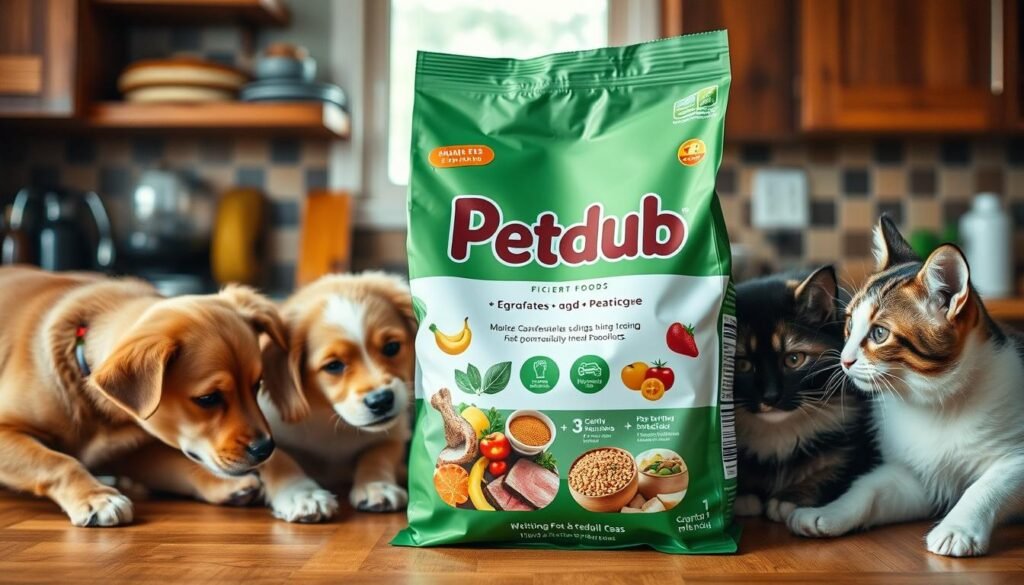
By carefully reading pet food labels and knowing the ingredients and nutrients, you can pick the best food for your pet. This supports their health and happiness.
Balanced Pet Food: The Key to Good Nutrition
Feeding your pet a balanced diet is key to their health. We’ll look at what makes a complete diet. It’s important to give the right mix of proteins, fats, carbs, vitamins, and minerals.
A balanced diet is vital for your pet’s health. It boosts their immune system, keeps their skin and coat healthy, and supports growth. Without the right nutrients, pets can face obesity, digestive issues, and nutritional deficiencies.
The role of balanced pet food is huge. Proteins build muscles, fats give energy, and carbs add more energy. Vitamins and minerals keep the body working right. With the right pet nutritional balance, your pet can flourish.
| Nutrient | Function | Recommended Daily Intake |
|---|---|---|
| Protein | Muscle development, growth, and repair | 18-30% of total calories |
| Fats | Energy source, organ function, coat health | 5-15% of total calories |
| Carbohydrates | Energy source, fiber for digestive health | 30-50% of total calories |
| Vitamins and Minerals | Immune function, bone health, enzyme activity | Varies by type and life stage |
Knowing the value of balanced pet food and ensuring the right pet nutritional balance is crucial. It helps your pet stay happy, healthy, and thriving for years.
Incorporating Fresh Foods and Supplements
While a balanced pet food regimen is key, adding fresh, whole foods and supplements can boost your pet’s health. We’ll look at the benefits of a raw pet diet and how supplements can enhance nutrition.
Benefits of a Raw Pet Diet
A raw pet diet, made of raw pet foods, is becoming more popular. It mimics a natural diet, offering unprocessed, nutrient-rich ingredients. Key benefits include:
- Improved digestion and nutrient absorption
- Reduced risk of obesity and related health issues
- Shinier coats and healthier skin
- Stronger teeth and gums
- Increased energy and vitality
But, it’s vital to consult with your vet to ensure the diet is balanced and meets your pet’s needs. Proper preparation and food safety are also key when switching to a raw diet.
The Role of Pet Dietary Supplements
Pet dietary supplements can offer extra health support. They can fill nutritional gaps, boost the immune system, and improve overall health. Common supplements include:
- Omega-3 and Omega-6 fatty acids for skin and coat health
- Probiotics and digestive enzymes for optimal gut health
- Joint-supporting supplements like glucosamine and chondroitin
- Antioxidants to combat free radicals and inflammation
Before adding raw pet diet benefits or supplements, talk to your vet. They can guide you on the right types and amounts for your pet’s needs and health.
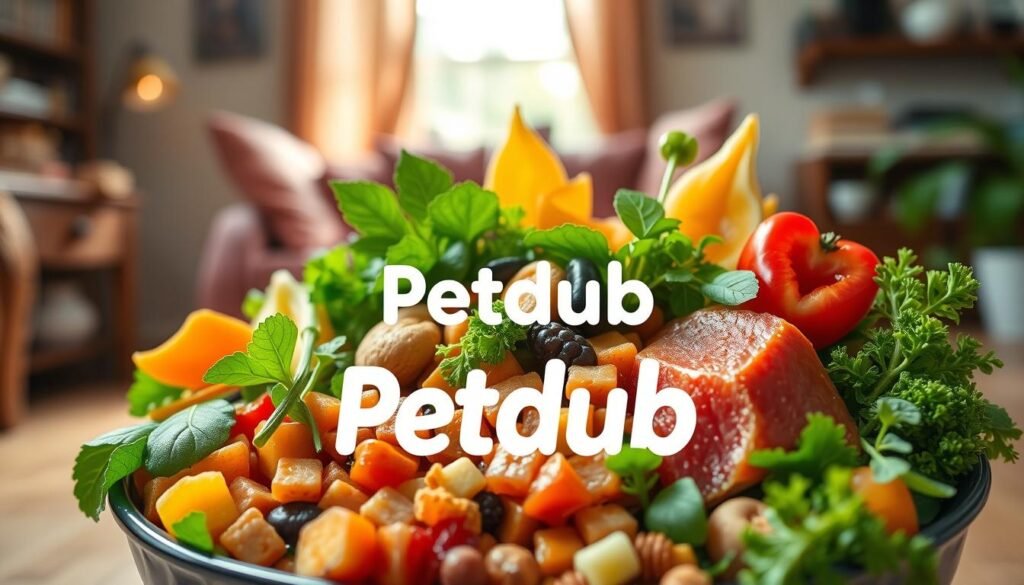
Pet Weight Management Strategies
Keeping your pet at a healthy weight is key for their long-term health. As pet owners, we must take steps to prevent obesity. This section will cover ways to help your pet stay at a good weight.
Portion control is a big part of managing your pet’s weight. Measure their food carefully. Adjust their portions based on their age, activity level, and breed. Talk to your vet to find out how much food they need.
Regular exercise is also important. Make sure your pet gets daily walks and playtime. This keeps them active and strengthens your bond.
- Implement a structured exercise regimen to keep your pet active and engaged.
- Adjust the intensity and duration of physical activities based on your pet’s age, breed, and overall health.
- Encourage playtime and interactive games to make exercise fun for your pet.
Some pets may have health issues that lead to obesity. Check with your vet to see if this is the case. Then, work on a weight management plan that fits your pet’s needs.
Keeping your pet at a healthy weight is a long-term effort. Use portion control, regular exercise, and address health issues. This will help your pet stay at a good weight and live a happy life.
Hypoallergenic and Special Dietary Needs
For some pets, finding the right food is key to staying healthy. Pets with food allergies or sensitivities need hypoallergenic pet food to meet their special needs. Knowing the signs of pet food allergies is the first step to help them.
Identifying and Addressing Food Allergies
Signs like itchy skin, chronic ear infections, and stomach problems can mean a pet food allergy. Vets often suggest a strict diet trial to find the right food. This trial uses new proteins and carbs to find the best hypoallergenic pet food for your pet.
- Common pet food allergens include chicken, beef, dairy, and wheat.
- Elimination diets and food trials are essential for accurate diagnosis and management.
- Strict adherence to the prescribed diet is crucial for identifying and addressing food allergies.
After finding the allergen, you need to switch your pet to a hypoallergenic pet food without the bad ingredients. This diet, along with any needed meds, can help your pet feel better and stay healthy.
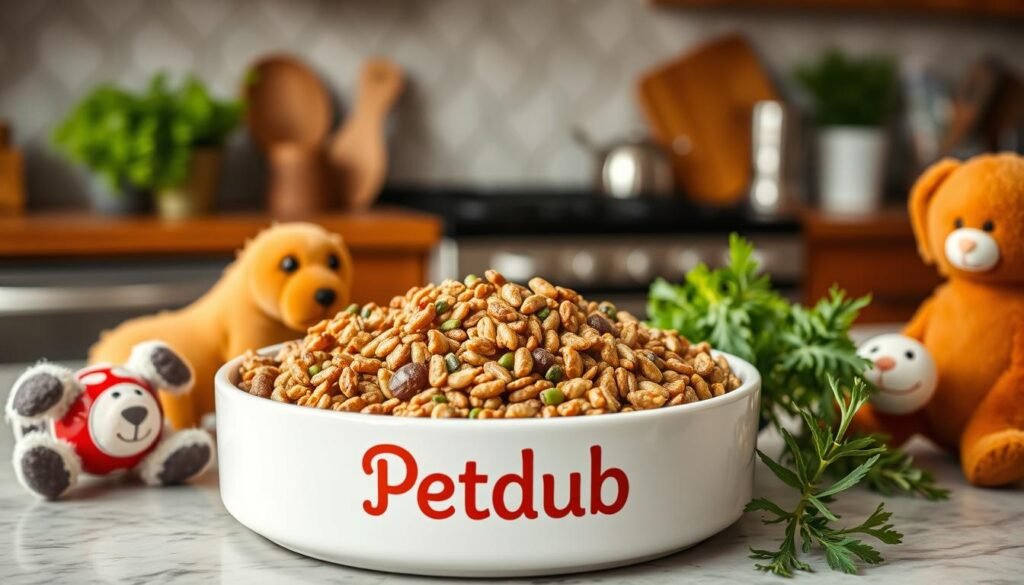
Dealing with pet food allergies takes time and teamwork with your vet. By knowing your pet’s needs and giving them the right special pet dietary solutions, you can make their life better and happier.
Homemade Pet Meals: Pros and Cons
Preparing homemade pet meals can be rewarding for pet owners. It lets them control their pets’ diets. But, it’s key to know the good and bad before starting.
Homemade meals offer clear ingredients and customization. You can pick top-quality ingredients and avoid bad additives. This way, you can make sure your pet gets what they need for better health.
But, making a homemade pet meal is hard work. It takes a lot of time and research to get it right. If done wrong, it can harm your pet’s health. There’s also the chance of contamination and the cost of good ingredients.
- Increased control over ingredients and quality
- Ability to customize the diet to your pet’s needs
- Potential for better digestibility and health benefits
- Time-consuming preparation and research required
- Risk of nutritional imbalances or contamination
- Higher financial investment in quality ingredients
Before switching to a homemade pet diet, talk to a vet. They can check if your pet’s meals are balanced and complete. With the right steps, homemade pet meals can be great. But, it’s important to think about both sides.
Pet Digestive Health and Nutrition
Keeping our pets’ digestive systems healthy is key to their happiness. We’ll look at how food affects their health, focusing on the gut microbiome. We’ll also talk about how to choose the right food for them.
Promoting a Healthy Gut Microbiome
The gut microbiome is a group of tiny living things in our pets’ intestines. It’s important for their pet digestive health. A balanced gut helps with immune function, nutrient absorption, and overall health. To keep it healthy, feed your pet a balanced diet with the right nutrients.
Here are some tips for a healthy gut microbiome in your pet:
- Feed them a diet rich in fiber from whole foods to nourish good bacteria.
- Try probiotic supplements or fermented foods to add good bacteria.
- Use antibiotics only when really needed to avoid upsetting the gut balance.
- Slowly introduce new foods to help their gut adjust.
- Make sure they drink enough water to support their digestive health.
By focusing on pet digestive health and a balanced diet, you can help your pet live a happy and healthy life.
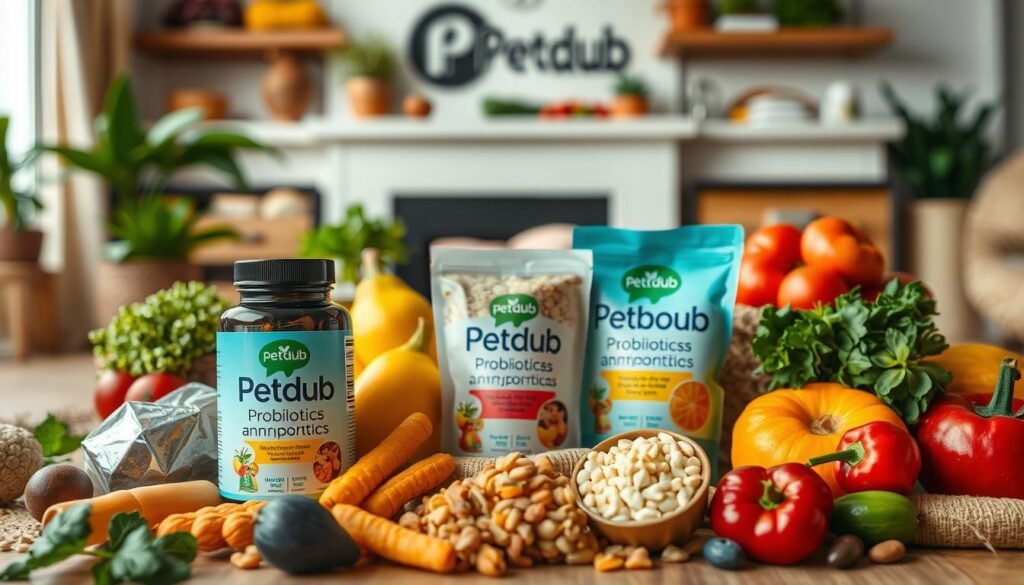
“A healthy gut is the foundation for a healthy pet. By nourishing the gut microbiome, we can unlock the key to our pets’ vitality and longevity.”
Addressing Pet Obesity and Related Issues
Keeping our pets at a healthy weight is key. Sadly, pet obesity is on the rise, affecting their health. We’ll look at why it happens, its effects, and how to prevent and manage it. This way, our pets can stay happy and healthy.
Pet obesity is common, hitting about 56% of dogs and 60% of cats in the U.S. It’s often caused by overfeeding, not enough exercise, and genetics. Being overweight can lead to serious pet obesity-related health issues, such as:
- Osteoarthritis and joint pain
- Diabetes
- Heart disease
- Respiratory problems
- Increased risk of certain cancers
To tackle pet obesity, we need a comprehensive plan. This includes regular exercise, controlling portions, and a balanced diet. Getting advice from a vet can help tailor a plan for your pet’s needs.
| Healthy Weight Range | Overweight | Obese |
|---|---|---|
| 20-25 BMI | 25-30 BMI | 30+ BMI |
By being proactive, we can help our pets live better lives. A bit of effort can make a big difference in their health and happiness.
“Obesity is one of the most common preventable health issues in pets. By working closely with your veterinarian, you can develop a plan to keep your furry friend at a healthy weight.”
Pet Dietary Supplements: When and Why?
We all want our pets to be healthy and happy. A good pet food usually meets their needs. But sometimes, supplements can help fill in the gaps. Let’s look at the vitamins and minerals supplements offer and how they can benefit our pets.
Essential Vitamins and Minerals
Pet supplements can keep your pet healthy. They often include important nutrients like:
- Omega-3 and Omega-6 fatty acids – These help with skin, coat, and inflammation.
- Glucosamine and chondroitin – Good for joints, especially in older pets.
- Probiotics – They support a healthy gut and immune system.
- Antioxidants – Vitamins C and E protect cells and support health.
Before adding supplements, talk to your vet. They can make sure they’re right for your pet.
| Supplement | Potential Benefits | Common Uses |
|---|---|---|
| Omega-3 and Omega-6 Fatty Acids | Support skin and coat health, reduce inflammation | Allergies, skin conditions, joint health |
| Glucosamine and Chondroitin | Maintain joint health and mobility | Osteoarthritis, joint support |
| Probiotics | Promote a healthy gut microbiome, support immune system | Digestive health, immune support |
| Antioxidants (Vitamins C and E) | Neutralize free radicals, support cellular health | Aging, cognitive function, immune support |
Knowing the benefits of pet dietary supplements helps us choose wisely. This way, we can support our pets’ health and happiness.
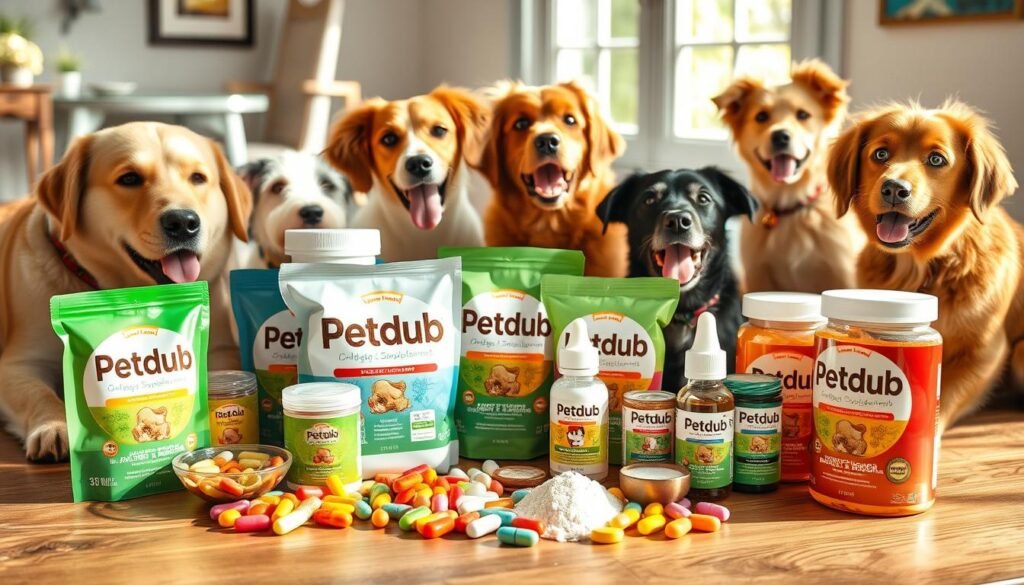
“Dietary supplements can be a valuable addition to a pet’s diet, but it’s essential to consult with a veterinarian to ensure they are appropriate and safe for your individual pet.”
Creating a Balanced Meal Plan for Your Pet
Creating a balanced diet for your pet is key to their health. We need to think about what our pets need to stay healthy. This guide will help you make a meal plan that fits your pet’s needs.
Creating a balanced pet diet means looking at several things. This includes your pet’s age, how active they are, and any special needs. Knowing these helps us make a pet meal planning plan that’s just right for them.
Determining Your Pet’s Nutritional Needs
The first step is to figure out what your pet needs to eat. This depends on their age, size, breed, and how active they are. Talking to your vet can give you great advice on what’s best for your pet.
Balancing Macronutrients and Micronutrients
A good meal plan balances macronutrients (like protein and fats) and micronutrients (like vitamins). This makes sure your pet gets all the nutrients they need. Choosing high-quality ingredients helps make a diet that’s just right for your pet.
Implementing a Feeding Schedule
Feeding your pet at the same times every day is important. This can be several small meals or one big one. It helps keep their diet balanced and prevents them from eating too much. Watching how much they eat helps keep them at a healthy weight.
Creating a balanced pet diet is a big part of caring for your pet. By thinking about their needs and making a meal plan, you help them stay healthy and happy.
| Nutrient | Recommended Daily Intake | Food Sources |
|---|---|---|
| Protein | 18-30% of total calories | Meat, poultry, fish, eggs, dairy |
| Carbohydrates | 30-50% of total calories | Grains, fruits, vegetables |
| Fats | 10-15% of total calories | Oils, fatty fish, nuts, seeds |
| Vitamins and Minerals | Varies by nutrient | Fruits, vegetables, supplements |
“A balanced pet diet is the foundation for a healthy, happy pet. By creating a personalized meal plan, you’re giving your furry friend the best chance at a long, vibrant life.”
Finding the Perfect Rescue Pet | Adopt Today
Conclusion
In this guide, we’ve talked about why healthy pet diets are key. We’ve given tips to help your pet live a long, happy life. By knowing what your pet needs, picking the right food, and adding fresh ingredients and supplements, you’re setting them up for health.
Your pet’s diet is a big deal for their future. Getting it right means a happy, healthy pet and helps the pet food industry too. The study on pet food’s environmental impact shows how important it is to be eco-friendly. This helps reduce emissions and save resources.
Starting your pet on the best nutrition is a journey. It’s about learning and changing as needed. Keep up with new info, talk to your vet, and try new things for your pet. Together, we can make sure our pets live long, healthy lives with us.

